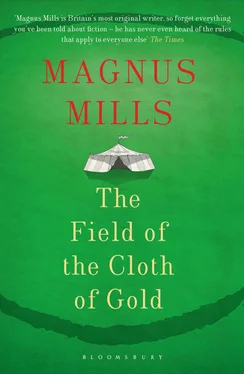Magnus Mills
The Field of the Cloth of Gold
After a week or so they sent round a message saying they had a surplus of milk pudding. They said they were willing to share it with the rest of us if we went into their camp at noon. All they asked was that we brought our own spoons and dishes. The offer was undoubtedly generous, but we thought the tone of the message was rather curt. Apparently there’d been some kind of blunder. From what we could gather, the blame for the surplus lay squarely with their cooks: it seemed they’d measured the ingredients in the wrong quantities.
‘What on earth do they need cooks for?’ said Isabella. ‘Can’t they do their own cooking?’
She’d been complaining about the newcomers for days, and now she had grounds for further criticism.
‘I don’t know for sure,’ I said, ‘but I imagine it’s just a matter of organization. There’s a fair few of them, so they probably find it better to share the jobs around. It’s called division of labour. Some act as porters, some take care of the tents, some wash the clothes, some do the cooking.’
‘Some do nothing,’ said Isabella.
‘Yes, I noticed that.’
‘Apart from giving orders.’
‘Perhaps the orders are a necessary element,’ I said, ‘to keep the camp running smoothly. You have to admit it all looks highly efficient.’
‘Well, if it’s so efficient,’ Isabella demanded, ‘why did they end up with a surplus of milk pudding?’
This was a good question. An error of such proportions was certainly out of character. Ever since they’d arrived their every move had appeared part of a carefully planned operation. We’d watched them cross the river from the south, bringing with them all manner of equipment, supplies and baggage. Teams of porters travelled back and forth in synchronized relays; accordingly there were no wasted journeys or misplaced items. Evidently they’d selected their ground in advance. We marvelled at the way they deployed their tents in a perfect grid formation. All the pitches were marked out precisely. Each tent was identical in size, colour and shape; each faced in the same direction; and each was separated from the next by exactly the same interval. Several command tents stood slightly apart from the main group. Between them ran a parallel thoroughfare which we’d already nicknamed the ‘high street’ because it was so busy with uniformed people coming and going. Every tent had a white pennant flying from its peak. When the work was finished the new encampment dominated the entire south-eastern part of the field. Along its boundary ran a low picket fence, and at each corner stood a flagpole. The camp had come into existence during the course of a single day, the process being overseen by a surveyor, a quartermaster and an inspector of works. Their logistical proficiency was astonishing to behold, yet despite all this they’d managed to produce a surplus of milk pudding.
‘An unfortunate lapse,’ I remarked.
Isabella gazed at the faraway tents; then she said, ‘I suppose you’re going to accept their offer.’
‘Yes,’ I replied. ‘Aren’t you?’
‘No.’
‘Why not?’
‘Because they’re rude!’ she snapped. ‘They constantly ignore us, and they haven’t even bothered to come and introduce themselves formally.’
I could have mentioned to Isabella that she was equally guilty of that charge; actually, none of us had made the slightest effort to welcome the new arrivals. Instead we’d all remained aloof, observing them as they went about their task but never drawing near. As a consequence, and because there were more of them than us, we’d suddenly become the outsiders dwelling on the fringes. Now they’d made a gesture of hospitality, and Isabella was determined to reject it. As for going and formally introducing herself, well that was quite beneath her. However, I knew from past experience that there was no point in arguing with Isabella.
‘Have you spoken to the others?’ I asked.
‘Yes,’ she said. ‘They’re going to give it a miss.’
‘Presumably Hen won’t be interested?’
‘I’m sure he won’t.’
‘So that leaves just me,’ I said. ‘A lone ambassador.’
‘I expect you’ll be alright,’ said Isabella. ‘It’s almost noon, so you’d better run along to the feast.’
I glanced over to Hen’s tent. There was no sign of him, and I guessed he hadn’t been informed of the offer. I would have liked to let him know, but it was too late now. I checked my appearance to ensure I was tidy; then I headed off towards the south-east corner, feeling as I went that the eyes of the whole field were upon me.
It was a bright, blustery day, and the flags were flying. As I approached the outer row of tents I realized I hadn’t trodden this stretch of land for a long, long while. The grass grew thick and lush beneath my feet, and I remembered how attractive this area had looked when I first saw it. On close inspection the tents turned out to be surprisingly small. They were buff-coloured and plainly utilitarian, with a single pole and a canopy rising to a point. The comfort of the occupants had patently not been taken into consideration. Even so, the fabric looked sturdy enough to resist the harshest of weather. The command tents were of the same design but much larger, and one of these served as a cookhouse. I had just paused outside it, uncertain of the correct protocol, when an abrupt blast from a trumpet signalled noon. (This trumpet was prominent on Isabella’s list of complaints: it sounded daily at dawn, noon and dusk, and never failed to irritate her. Isabella preferred to get up at least three hours after sunrise; if her sleep was interrupted it put her in a bad mood for most of the day. Personally, I quite liked to hear the trumpet’s distant tones through the soft walls of my tent, but at short range even I had to confess it was a bit too loud. In fact, it made me jump.) All at once people began to converge on the cookhouse. A flap parted and a man appeared who I recognized as the messenger. With a wave of his hand he summoned me inside.
‘Excellent,’ he said. ‘You’ve brought your dish and spoon. I’ll put you at the front of the queue.’
There were already several people lining up at a counter, but he led me straight past them and presented me to the cooks.
‘Make sure he has a generous helping,’ he ordered, before slipping away.
I thought the cooks looked a little disconsolate. There were three of them, and they each wore a white cook’s hat. They stood behind some large cast-iron vessels, stirring the contents sullenly.
‘Hot or cold?’ said one of them.
It was a question I hadn’t been expecting. To tell the truth I’d never sampled milk pudding, so I wasn’t sure which to choose.
‘What do you recommend?’ I enquired.
‘It’s a chilly day for the time of year,’ he said, ‘so I suggest you try hot.’
‘Alright,’ I said. ‘Hot. Thank you.’
‘Sour milk or plain?’
‘Don’t know.’
‘Try plain.’
‘Alright.’
‘Do you want it sweetened or salted?’
‘Sweetened please.’
‘Right you are.’
He peered at my dish and I held it out; then, unceremoniously, I received a large dollop of milk pudding. I thanked the cooks and turned away just as the messenger came back. He seemed slightly harassed.
‘Where are your companions?’ he asked. ‘I’ve been looking out for them but they haven’t arrived yet. I hope they won’t be much longer.’
‘Oh,’ I said. ‘No, sorry, it’s only me I’m afraid.’
The expression that crossed his face was a mixture of consternation and sheer puzzlement.
Читать дальше












